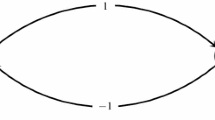Abstract
We consider zero-sum Markov games with incomplete information. Here, the second player is never informed about the current state of the underlying Markov chain. The existence of a value and of optimal strategies for both players is shown. In particular, we present finite algorithms for computing optimal strategies for the informed and uninformed player. The algorithms are based on linear programming results.
Similar content being viewed by others
References
Balinski M (1961) An algorithm for finding all vertices of convex polyhedral sets. J SIAM 9:72–88
Domansky V, Kreps V (1994) “Eventually revealing” repeated games with incomplete information. Internat. J. Game Theory 23:89–99
Domansky V, Kreps V (1995) Repeated games and multinomial distribution. Mathem. Meth. Operat. Res. 42:275–293
Filar J, Vrieze K (1997) Competitive Markov decision processes. Springer-Verlag, New York
Heuer M (1991) Optimal strategies for the uninformed player. Internat. J. Game Theory 20:33–51
Mattheiss T (1973) An algorithm for determining irrelevant constraints and all vertices in systems of linear inequalities. Operations Research 21:247–260
Melolidakis C (1984) On stochastic games with lack of information on one side. PhD Thesis, University of California, Los Angeles
Melolidakis C (1989) On stochastic games with lack of information on one side. Internat. J. Game Theory 18:1–29
Melolidakis C (1991) Stochastic games with lack of information on one side and positive stop probabilities. In: Raghavan TES et al. (eds): Stochastic games and related topics, Kluwer Academic Publishers, pp. 113–126
Mertens JF, Sorin S, Zamir S (1994) Repeated games. Core Discussion Paper 9420, 9421, 9422, Université Catholique de Louvain
Nowak AS (1986) Semicontinuous non-stationary stochastic games. J Math. Anal. Appl. 117:84–89
Ponssard JP, Sorin S (1980) The LP formulation of finite zero-sum games with incomplete information. Internat. J Game Theory 9:99–105
Rieder U (1975) Bayesian dynamic programming. Adv. Appl. Prob. 7:330–348
Rieder U (1978) On semi-continuous dynamic games. Technical Report, Universität Karlsruhe
Author information
Authors and Affiliations
Rights and permissions
About this article
Cite this article
Krausz, A., Rieder, U. Markov games with incomplete information. Mathematical Methods of Operations Research 46, 263–279 (1997). https://doi.org/10.1007/BF01217695
Received:
Revised:
Issue Date:
DOI: https://doi.org/10.1007/BF01217695




